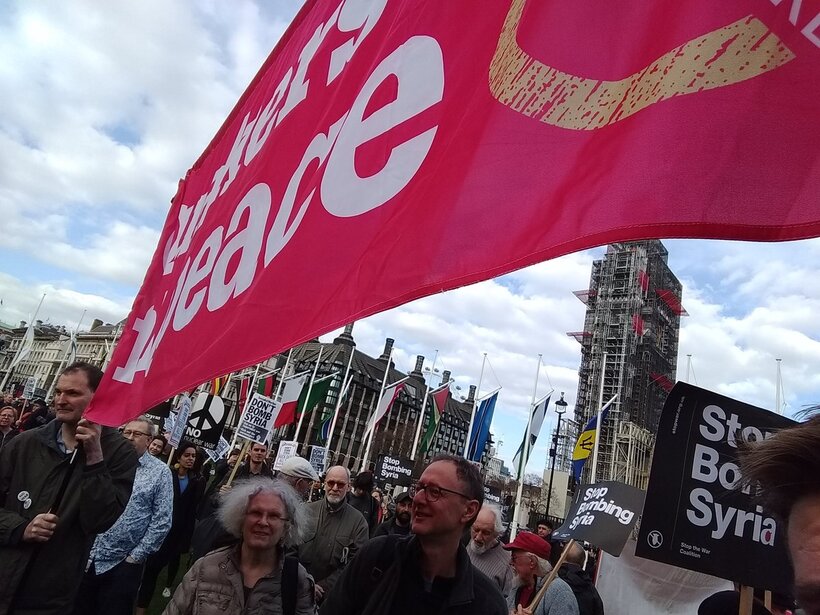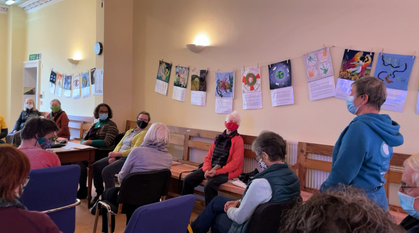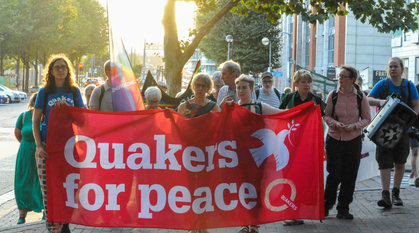Syria: 6 things you can do
Following UK military action in Syria, Sahdya Darr suggests six things you can do.

In recent weeks my mind has been occupied with thoughts of Syria. I have spent a lot of time reading the reactions of Syrian activists in the diaspora to the launch of airstrikes, and listening to what my Syrian friends thought, many of whom still have family living there. For those of us not directly impacted by the conflict, and who haven't experienced the unimaginable suffering and loss as a result, what can we do?
On 12 April Quakers in Britain made a statement opposing military action in Syria, reiterating the importance of working for peace and expressing concern about the sidelining of democratic processes. In the early hours of Saturday 14 April it was reported that airstrikes had been launched without parliamentary approval. Now Friends are asking what they can do in response. Here are six actions you can take:
1. Write to your MP
You and/or your local meeting could write to or meet with your MP. As military action has already been taken, it may be better to send your letter by email so that it reaches your elected representative quicker. You could send your MP the full statement from Quakers in Britain and use the list of points in 'A guide to taking action on Syria'. Alternatively, you could use this Stop the War coalition model letter.
2. Engage in wider discussions about security
The conflict in Syria profoundly matters for our world because it affects international peace and stability. How can peace be more effectively promoted at home and abroad? Read and share the statement from Rethinking Security on UK military intervention in Syria. Take part in civic conversations about it and attend the national conference in June to explore new approaches to national security.
3. Take part in vigils and demonstrations
There have been nationwide protests in response to the launch of airstrikes in Syria. Find a demonstration near you at www.stopwar.org.uk.
4. Get the word out
Write to your local newspaper, tweet and blog. You could open up a discussion on Facebook or tell your local media that you have written to your elected representative or are planning a vigil. If you are approached by the media please contact Anne van Staveren on annev@quaker.org.uk.
5. Practice meaningful solidarity
Many Quaker meetings are Sanctuary Meetings that have welcomed and advocated on behalf of Syrian refugees. It's important to keep well-informed about the situation in order to take appropriate action. Here are some highly recommended articles and books to read about Syria:
Articles
- Saleh, Maryam, A Syria for all its people – two books on an unnecessary war, accessed 15 April 2018
- Al-Shami, Leila, The 'anti-imperialism' of idiots, accessed 14 April 2018
- Al Jazeera English, Syria's civil war explained from the beginning, accessed 14 April 2018
Books
- Al-Haj Saleh, Yassin (2017), The impossible revolution: making sense of the Syrian tragedy, London: C Hurst & Co Publishers Ltd.
- Pearlman, Wendy (2017), We crossed a bridge and it trembled, New York: Custom House.
- Yassin-Kassab, Robin and Al-Shami, Leila (2018), Burning country: Syrians in revolution and war, London: Pluto Press.
- Halasa, Malu, Omareen, Zaher and Mahfoud, Nawara (eds) (2014), Syria speaks, London: Saqi Books. Available from the Quaker bookshop.
- Wedeen, Lisa (1999), Ambiguities of domination: politics, rhetoric, and symbols in contemporary Syria, Chicago: University of Chicago Press.
6. Engage within your local meeting
Not everyone in your local meeting will be of the same mind about a suitable Quaker response. If your Quaker meeting is unsure about how to respond, you could read Advice for Friends in times of war (PDF) for guidance.


